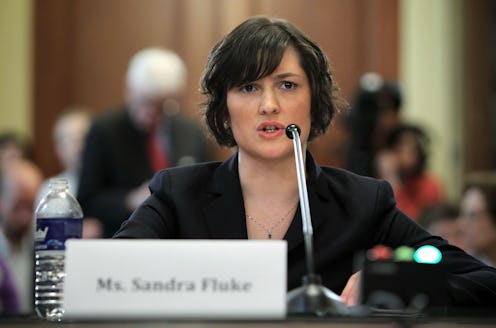News
I Took On Victim-Blamers Way Before Rush Limbaugh Called Me A Birth Control “Slut”

This year, Bustle is celebrating Rule Breakers — the women and non-binary individuals among us who dare to be themselves no matter what. In the lead-up to our list of Bustle's Rule Breakers of 2018 going live in late August, we are featuring stories from an array of individuals about critical moments when they didn't do as they were told. In a world that encourages us to conform unquestioningly, they refused to look or act the part, and we're all better for it. Click here to buy tickets for the event.
Folks may remember that I was the woman who testified before members of Congress about birth control coverage under the Affordable Care Act (otherwise known as Obamacare). I took on Rush Limbaugh over his slurs calling me a "slut" when I testified about reproductive health care. But growing up, I came from a very conservative rural community — very different than the one that I am a part of now in Los Angeles.
I remember a number of instances when I just didn’t quite agree with things that I was seeing in my community. When I was either a freshman or sophomore in high school, there was a classroom discussion about a sexual assault case, and some students were engaging in victim blaming because of what the victim had been wearing. That really bothered me, and I spoke up; it shouldn’t be her fault. But one of the other students just said, “Rape happens, and you have to take precautions to prevent that. If you don’t, it’s your fault.”
There’s some real problems with that logic of who is bearing the responsibility for an assault that someone else is committing. But that was more nuanced than I was ready to articulate at that point. I got out: “That’s not fair.”
The teacher was trying to support me, but cut off the conversation because I was "sensitive." It wasn’t that I was sensitive; it was that other people were inappropriate.
I felt like I didn’t do a good job — like I didn’t present my case well. I remember worrying about how it came off, but I don’t remember thinking to myself, "Well I should never speak up again." It seems like I certainly did not learn that lesson, so I suppose there was a part of me that thought, "At least I said something."
It gets easier, and you get better at it with time.
That was actually one of the things I took into consideration when I thought about how to respond to the verbal attacks by Mr. Limbaugh and other conservative commentators. I really wanted to think through what message this experience was going to send to young girls.
I didn’t want them to take away the message that "I shouldn’t speak up, and I certainly shouldn’t speak up about reproductive health care."
I wanted them to learn that if you speak up about these things, you might be attacked — there are real fights in our society. But if you’re attacked, people will be with you and support you. You can continue standing up, and continue pushing back, and ultimately feel proud of how you handled the situation. That’s an admirable and strong thing to do.
I don’t think I know any attorney or any advocates who have ever walked away from a speech, or an event, or an interview that hasn’t thought, "I want to do this differently next time." We’re all striving to be more compelling and to better connect with and reach our audience. There is no perfect way.
So for any of us, especially for folks who are just starting out at whatever age, it’s about just saying it. Just taking that first step. Standing up that first time. And it gets easier, and you get better at it with time. You will be shocked and surprised at the people who rally at your side.
Even on a tiny scale, someone else in your classroom hearing you speak up, that could mean an enormous amount to them. So go ahead. You never know who’s listening.
As told to Lauren Holter. This interview has been condensed and edited for clarity.